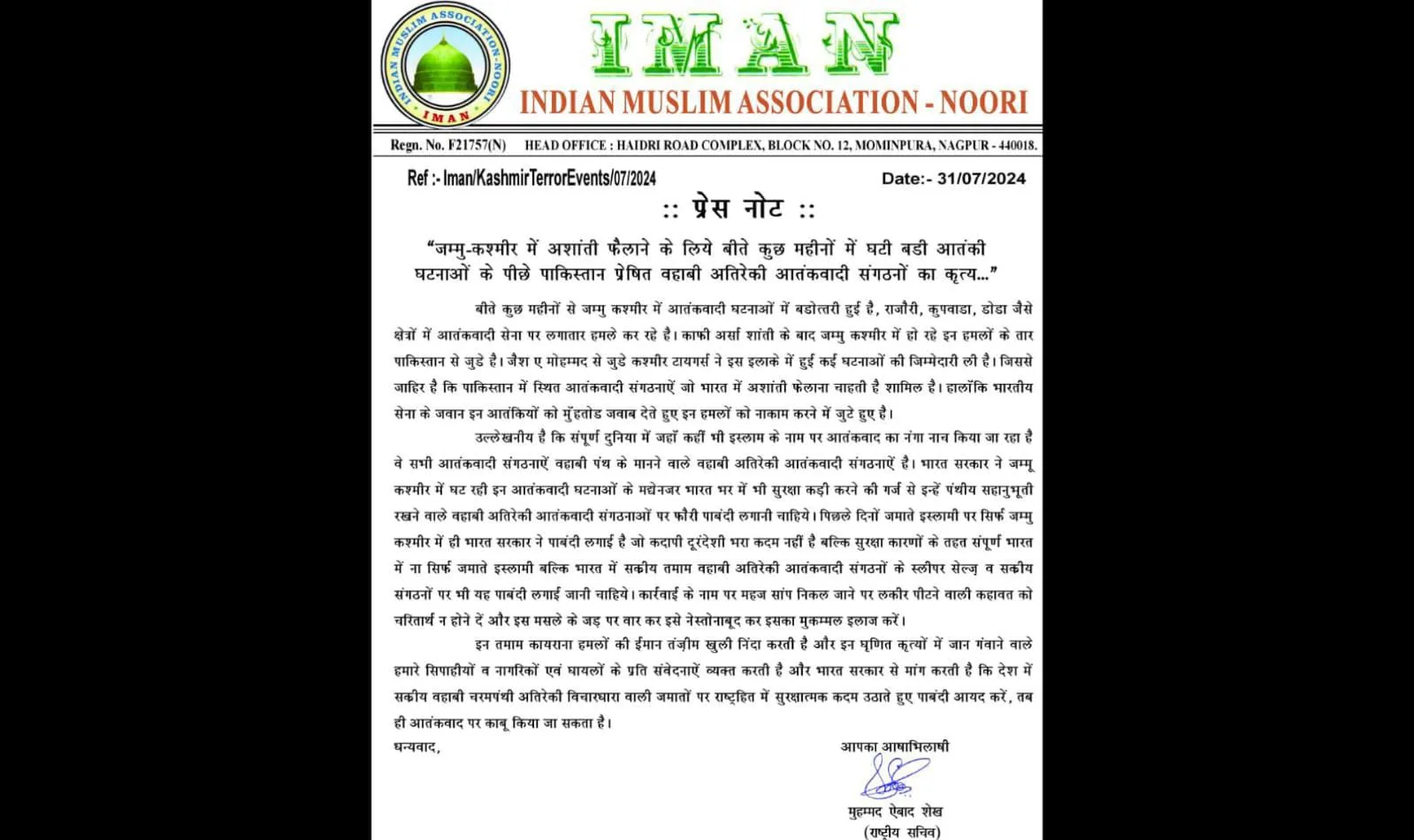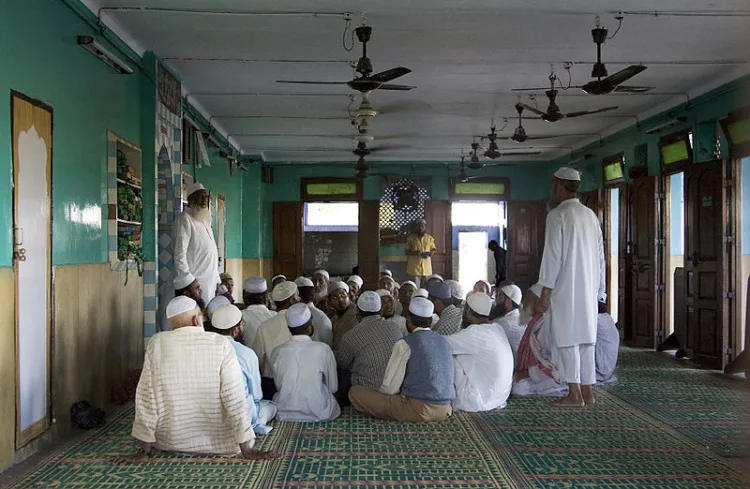On July 31, the Indian Muslim Association-Noori (IMAN) issued a press release calling for a nationwide ban on the controversial Islamic organisation Jamaat-e-Islami. IMAN accuses Jamaat-e-Islami of promoting terror activities not only in parts of Jammu & Kashmir but across India. The organisation also alleges that Jamaat-e-Islami is instilling anti-India and jihadi narratives among young people through their educational programs and institutes.
The President of IMAN, Engineer Hamid, exclusively spoke to Organiser Weekly on August 2 and elaborated on these demands and allegations. He stated, “We not only want Jamaat-e-Islami to be banned nationwide but we also want the government to identify the educational programs organised by the Jamaat, their events, and the individuals promoting this ideology, to be exposed and dismissed with immediate effect.”
IMAN’s press release and subsequent statements reflect growing concerns about the impact of Jamaat-e-Islami’s activities on national security and social harmony in India.
The press note issued by IMAN reads:
“The actions of Wahabi extremist terrorist organisations sent by Pakistan are behind the major terrorist incidents that have taken place in the last few months to spread unrest in Jammu & Kashmir…”
Terrorist incidents have increased in Jammu & Kashmir in the last few months, with terrorists continuously attacking the army in areas like Rajouri, Kupwara, and Doda. After a long period of peace, these attacks in Jammu & Kashmir are linked to Pakistan. Kashmir Tigers, associated with Jaish-e-Mohammed, have claimed responsibility for many incidents in this area. This indicates that terrorist organisations based in Pakistan, aiming to spread unrest in India, are involved. However, Indian Army soldiers are giving a befitting reply to these terrorists and are actively working to thwart these attacks.
It is noteworthy that wherever terrorism is being perpetrated in the name of Islam around the world, all those terrorist organisations are Wahabi extremist groups that follow the Wahabi sect. In light of the terrorist incidents in Jammu & Kashmir, the Indian government should impose an immediate ban on these Wahabi extremist organisations that have sectarian sympathies, to tighten security across India. Recently, the Indian government has imposed a ban on Jamaat-e-Islami only in Jammu & Kashmir. This is not a farsighted step at all. For security reasons, this ban should be imposed not only on Jamaat-e-Islami but also on the sleeper cells and active organisations of all Wahabi extremist terrorist groups in India. In the name of action, the government should not just make a superficial show but attack the root of this issue and eradicate it completely.

IMAN Tanzeem openly condemns all these cowardly attacks, and expresses condolences to our soldiers and civilians who lost their lives in these heinous acts, and to those injured. They demand that the Indian government take precautionary measures in the national interest and ban the groups with Wahabi extremist ideologies in the country. Only then can terrorism be controlled.
Hamid told this correspondent, “We are demanding Jamaat-e-Islami to be banned across India, as it is a notorious organisation. It has already been banned in Jammu & Kashmir, and even the Bangladeshi Prime Minister Sheikh Hasina banned it in Bangladesh. It is notorious because the members of this organisation were fighting with our army back in 1971 in the Bangladesh Liberation War. Terror outfits like SIMI have been the youth wing of this organisation, their motives simply align with ISIS and Al-Qaeda.”
Describing Jamaat-e-Islami, he called it a Wahabi-Salafi organisation with roots in Saudi Arabia, adding that the Muslims following this sect consider themselves superior and are always working towards “Ghazwa-e-Hind” and jihadi activities.
“You should know that members of Jamaat-e-Islami are Wahabi-Salafis, and Al-Qaeda, ISIS, and the Taliban are all Wahabi-Salafi organisations,” Hamid explained. “If we talk about Islam, people who consider Dargah as a religious place, meaning Sufis and Sunnis, constitute around 85 per cent of the Muslim population. Around 7-8 per cent are Deobandis who run organisations like Jamiat-e-Ulema-e-Hind, etc. As low as one to two per cent are the followers of Jamaat-e-Islami, who are Ahl-i Hadith, with their main headquarters in Saudi Arabia and Qatar.”
Hamid further noted, “The Hamas leader Ismail Haniyeh, who has been killed recently, comes from the same Salafi-Wahabi sect of Islam and was a follower of the Jamaat-e-Islami ideology.”
The Jamaat-e-Islami ideology holds that, aside from their followers, particularly Sunnis, other Muslims are not true Muslims and should remain underprivileged while Salafi-Wahabis engage in politics and other superior activities. Abul A’la Maududi is considered the founder of this sect. In 1941, the British formed a political party named Jamaat-e-Islami for him. During the partition, he moved to Pakistan and continued his party there. In India, Jamaat-e-Islami did not get re-registered as a political party but remains active as an organisation.
Hamid said, “This organisation keeps creating chaos. They have several controversial outfits like SDPI, PFI, and many others. Many of their factions are active across India. Radical Islamic preachers like Zakir Naik also follow the same motto as Jamaat-e-Islami.”
As per Hamid, in India, there are many leaders who follow this ideology, prominently including Asaduddin Owaisi, the chief of AIMIM, Azam Khan, and Abu Hashim Azmi, among others. They all belong to this sect. Despite constituting a mere one per cent of the Muslim population, they lead both politically and economically.
Hamid added, “Wahabi-Salafis, despite being in the minority, engage in activities like radicalising youth and training them for Jihad, calling themselves true Muslims, just to attract the youth and people towards them. Otherwise, being such a minority, who would listen to them? They only want to achieve their political motives.”
“If we talk about Muslims in Kashmir, they are predominantly followers of the Sunni sect, also known as Sufism, meaning they worship Sufi saints like Haji Ali, Chisti, and others,” Hamid explained. “But followers of the Salafi-Wahabi sect have been radicalising Sunni children, using them against India, and fueling them with the ideas of Jihad, promising jannat and the terror of jahannum. The innocent Sunni people have been manipulated into participating in such radical activities,” he added.
Hamid claims there was peace in the valley when Article 370 was revoked, and the Muslims in Jammu & Kashmir expected improvements and developments after the revocation. “The terror activities have nothing to do with the revocation of Article 370. All the current unrest is completely funded and driven by Jamaat-e-Islami, which is why IMAN is opposing them,” he asserted.
He added, “The Jamaat targets young minds, motivating them to pursue Jihad. They need to be banned.”
Hamid also highlighted the role of educational institutions run by Jamaat-e-Islami and its parallel organisations. “These institutions, whether schools or colleges, are simply factories of terror. They instill the ideas of division and Jihad in young minds very early in their lives. They don’t run many madrasas, but they have schools. From these schools, they attract youngsters, and hence, this needs to be banned,” he emphasised.
IMAN stresses the need for a thorough investigation of the educational institutions run by Jamaat-e-Islami, the individuals following this ideology, and their access to young minds. According to IMAN, these institutions are the primary sources for turning youngsters into terrorists and should be banned not just in Jammu & Kashmir but across India.
Hamid, who comes from the Sunni-Barelvi sect of Islam, leads IMAN in its efforts against terror organisations in India that use religious teachings as a cover. A retired government servant from the Maharashtra Irrigation Department, Hamid now runs IMAN along with other businesses.
History of Jamaat-e-Islami
Jamaat-e-Islami was founded by Sayyid Abul A’la Maududi, with the agenda of Islamic conquest and “bringing the world under the flag of Islam.”
A few years ago, the International Crimes Tribunals in Bangladesh described JeI’s role during the 1971 War of Independence as an active collaborator with Pakistani occupation forces. JeI played a crucial role in forming auxiliary forces such as the Razakar, Al-Badr, Al-Shams, and the Peace Committee, which participated in atrocities against Bengali freedom fighters, particularly Hindus. Hundreds of thousands of Hindu men, women, and children were massacred, and many Hindu girls and women were raped by JeI and its forces.
In Pakistan, Jamaat-e-Islami has remained prominent due to its involvement in electoral politics. In the 1950s, it launched a militant student wing, Islami Jamiat-e-Talaba, which gained control of many urban colleges and universities through violent tactics. This marked Jamaat’s first use of violence.
Jamaat-e-Islami maintains deep links with various militant outfits, including Gaza-based Hamas and Palestinian Islamic Jihad (PJI), as well as the Muslim Brotherhood. This dangerous Islamist entity has had a presence in Europe since the 1960s and has a prominent presence in the United States.









![A Representative image [ANI Photo]](https://organiser.org/wp-content/uploads/2025/12/representative-image-e1765612818961-120x70.webp)









Comments